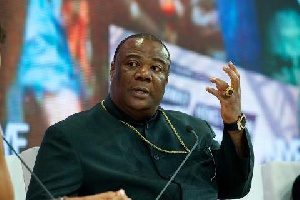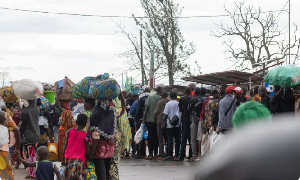The Founder of the Christian Action Faith Ministries (CAFM), Archbishop Nicholas Duncan-Williams, on Sunday September 14, 2014, told his congregation in Church that his prophecy that Ghana’s ailing currency – The Cedi – will start holding its own against the Dollar by the end of August, is now coming to pass.
“…I told you that by the end of August, I saw a window of opportunity, remember? End of August, about the economy, and I said we should pray that we won’t miss that window, because if that window is shut, we are in trouble, and that from September going, things will start changing, you remember?” He asked the Church.
“Some of you, you’re not students of prophecy. Because I don’t stand here and say: ‘if I be a man of God, if I be a prophet, because I don’t do that you don’t believe my prophecies’, Amen! You don’t believe my prophecies. And you saw how the whole law change was reversed in August. Somebody was telling me the other day – a bank Manager – he said: ‘Papa, the Dollar is coming down; it’s falling against the Cedi. Are you hearing me somebody”, the Action Chapel General Overseer said.
Duncan-Williams, on February 2, 2014, while leading his Church to pray for the local currency to stop falling, commanded the Cedi to gain strength against the Dollar and other major currencies of international trade.
“…I hold up the Cedi with prayer and I command the Cedi to recover and I declare the Cedi will not fall; it will not fall any further. I command the Cedi to climb. I command the resurrection of the Cedi. I command and release a miracle for the economy”, he prayed.
At the time (February), the US Dollar, which sold at Ghc2.20 on the local foreign exchange market before Christmas in 2013, sold at Ghc2.60. The British pound, which sold at Ghc3 during the same period, sold at Ghc4.20, while the Euro and CFA sold at Ghc3.50 and Ghc4.80 respectively.
The year-on-year depreciation of the Cedi at the time was 21.96 per cent against the Dollar; 28.88 per cent against the Pound Sterling; 23.98 per cent against the Euro and 25.54 per cent against the Swiss franc.
The trend prompted the Bank of Ghana to inject US$20 million into the forex market as part of efforts to shore up the Cedi.
Duncan-Williams, on that first Sunday in February, also led his church to pray for President John Mahama, Finance Minister Seth Terkper and Central Bank Governor Dr Henry Kofi Wampah, for divine help and guidance to salvage the Cedi.
“In the name of Jesus, say Satan take your hands off the President; take your hands off the Central Bank and the Finance Minister. Say we release innovation for the President, my God, the Governor of the Bank of Ghana, Central Bank, in the name of Jesus Christ the son of God, the Finance Minister. Say we command new ideas, breakthroughs and a miracle for the economy. Let the cedi rise in Jesus name," he led in prayer.
His Cedi prayer attracted a flurry of criticism from some Ghanaians, including former head of Monitoring and Evaluation, Dr Tony Aidoo, who described the spiritual declaration as a “comic relief”.
“At best, it is a comic relief, but seriously, at worst it is a big problem for us because it goes to reinforce the attitude – the undevelopmental attitude of Ghanaians …You attribute everything that is positive to God and everything that is negative to the devil, so the two names become the most commercialised …And then you become vulnerable to the exploitation of the clergy," Dr Aidoo thundered on Joy FM’s Super Morning Show the morning after the prayer.
“…It is only lazy people who become excessively religious because they want to transfer their responsibilities to others to solve for them….So you will definitely accept Archbishop Duncan- Williams that he is going to command the Cedi to come down. Is he going to command the people at Abossey Okai not to go to China and Japan to import the spare parts? How is he going to feed all those people? I don’t understand, what kind of attitude is this?”
Also on the criticism bandwagon at the time, was Gabby Asare Otchere-Darko, former Executive Director of the policy Think Tank, Danquah Institute, who said: “Could any patriot close to Trassacco Village go and advise Bishop Duncan-Williams to go the direct route by praying for the NPP instead because this government can’t save the Cedi. It calls for competent managers of the economy."
Similarly, Managing Editor of the Insight Newspaper, Kwesi Pratt Jr, suggested, in jest, on Adom TV’s Badwam programme that Ghanaians should vote for Archbishop Duncan-Williams as President to “spiritually arrest” the country’s problems.
Some of the critics were also clerics. While Peace Council Chairman, Reverend Prof Emmanuel Asante, said the power of prayer could not be underestimated, he nonetheless pointed out in an interview with Radio XYZ that: “Simply praying will not turn the economy around, but it is prayer and action.”
“Whatever it is, I believe as a reverend minister, he was concerned about the wellbeing of our economy and this is what he has proffered and what he put forward was to pray for God to do something about it. God is a prayer-answering God but that is not the only panacea to the problems that we have. We need to go further and the technocrats will do what they need to do and we will continue to pray for those who have the technical know-how to push our economy forward, but we believe that with God all things are possible,” he said.
Still within the clergy, Spokesperson for a group called ‘Concerned Clergy Association of Ghana’, Bishop Prince Benny Wood, told Ark FM in Sunyani at the time that: “The Cedi has not committed any offence to warrant any spiritual deliverance from anybody”. In the group’s view, the managers of the economy rather needed those prayers.
Currently, according to Xe.com, the Dollar: Cedi exchange rate is US$1: GHS3.59. A month ago, international news media including Reuters and the Financial Times quoted the Cedi as having fallen by 40 per cent against the Dollar. Ghana’s Minister of Communication, in a statement, denied the figure and said the Cedi had fallen by nearly 23 per cent.
In his September 14 sermon, Duncan-Williams said the avalanche of criticism against him, concerning his prayer for the Cedi and the economy, will not stop him from believing that God can turn Ghana’s financial circumstances around.
“…I’m not going to stop believing. I’m going to believe that it’s gonna get better. Confidence in our money and investing in Ghana is gonna come back again. I’m believing God. I’m a believer, and I will not stop believing and I will not stop praying for this country. It doesn’t matter the name you call me, what you tag me with; what you say about me doesn’t determine my future, it’s what I say not what you say. My life is not in your hands so you can say whatever you want to say.
“You don’t feed me and you don’t anoint me, so I’m not bothered at all about public perceptions of me. People are saying, people are saying, people will always say, so please God, live your life. Are you hearing me? As for what people say, people will always say. If you know things I hear about me, it will shock you. And I tell my children all the time, I say: ‘you know something, I’ve come to the conclusion that if what people say and people’s perception of a person works, I would have been dead long time ago. Sometimes people will send me a text, and they’ll say that: ‘Oh we’ve heard that you are dead’, and I say: ‘Me? Wrong address. It’s not me," Duncan-Williams told the congregation.
General News of Sunday, 14 September 2014
Source: starrfmonline.com













